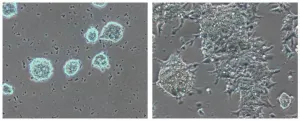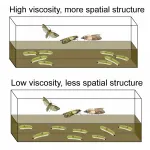(Press-News.org) Octopuses are known to sleep and to change color while they do it. Now, a study publishing March 25 in the journal iScience finds that these color changes are characteristic of two major alternating sleep states: an "active sleep" stage and a "quiet sleep" stage. The researchers say that the findings have implications for the evolution of sleep and might indicate that it's possible for octopuses to experience something akin to dreams.
Scientists used to think that only mammals and birds had two sleep states. More recently, it was shown that some reptiles also show non-REM and REM sleep. A REM-like sleep state was reported also in cuttlefish, a cephalopod relative of the octopus.
"That led us to wonder whether we might see evidence of two sleep states in octopuses, too," says senior author Sidarta Ribeiro of the Brain Institute of the Federal University of Rio Grande do Norte, Brazil. "Octopuses have the most centralized nervous system of any invertebrate and are known to have a high learning capacity."
To find out, the researchers captured video recordings of octopuses in the lab. They found that during 'quiet sleep' the animals were still and quiet, with pale skin and eye pupils contracted to a slit. During 'active sleep,' it was a different story. The animals dynamically changed their skin color and texture. They also moved their eyes while contracting their suckers and body with muscular twitches.
"What makes it more interesting is that this 'active sleep' mostly occurs after a long 'quiet sleep'--generally longer than 6 minutes--and that it has a characteristic periodicity," Ribeiro says.
The cycle would repeat at about 30- to 40-minute intervals. To establish that these states indeed represented sleep, the researchers measured the octopuses' arousal threshold using visual and tactile stimulation tests. The results of those tests showed that in both 'active' and 'quiet sleep' states, the octopuses needed a strong stimulus to evoke a behavioral response in comparison with the alert state. In other words, they were sleeping.
The findings have interesting implications for octopuses and for the evolution of sleep. They also raise intriguing new questions.
"The alternation of sleep states observed in the Octopus insularis seems quite similar to ours, despite the enormous evolutionary distance between cephalopods and vertebrates, with an early divergence of lineages around 500 million years ago," says first author and graduate student Sylvia Medeiros of the Brain Institute of the Federal University of Rio Grande do Norte, Brazil.
"If in fact two different sleep states evolved twice independently in vertebrates and invertebrates, what are the essential evolutionary pressures shaping this physiological process?" she asks. "The independent evolution in cephalopods of an 'active sleep' analogous to vertebrate REM sleep may reflect an emerging property common to centralized nervous systems that reach a certain complexity."
Medeiros also says that the findings raise the possibility that octopuses experience something similar to dreaming. "It is not possible to affirm that they are dreaming because they cannot tell us that, but our results suggest that during 'active sleep' the octopus might experience a state analogous to REM sleep, which is the state during which humans dream the most," she says. "If octopuses indeed dream, it is unlikely that they experience complex symbolic plots like we do. 'Active sleep' in the octopus has a very short duration--typically from a few seconds to one minute. If during this state there is any dreaming going on, it should be more like small videoclips, or even gifs."
In future studies, the researchers would like to record neural data from cephalopods to better understand what happens when they sleep. They're also curious about the role of sleep in the animals' metabolisms, thinking, and learning.
"It is tempting to speculate that, just like in humans, dreaming in the octopus may help to adapt to environmental challenges and promote learning," Ribeiro says. "Do octopuses have nightmares? Could octopuses' dreams be inscribed on their dynamic skin patterns? Could we learn to read their dreams by quantifying these changes?"
INFORMATION:
This work was supported by the State University of Rio Grande do Norte (UERN), the Coordenação de Aperfeicoamento de Pessoal de Nível Superior (CAPES), Conselho Nacional de Desenvolvimento Científico e Tecnológico (CNPq), and from the São Paulo Research Foundation (FAPESP) Center for Neuromathematics.
iScience, Medeiros et al.: "Cyclic alternation of quiet and active sleep states in the octopus" https://www.cell.com/iscience/fulltext/S2589-0042(21)00191-7
iScience (@iScience_CP) is an open access journal from Cell Press that provides a platform for original research and interdisciplinary thinking in the life, physical, and earth sciences. The primary criterion for publication in iScience is a significant contribution to a relevant field combined with robust results and underlying methodology. Visit http://www.cell.com/iscience. To receive Cell Press media alerts, contact press@cell.com.
More than half of the opioid tablets prescribed for patients who underwent orthopaedic or urologic procedures went unused in a new study by researchers at the Perelman School of Medicine at the University of Pennsylvania. Using an automated text messaging system that regularly checked in with patients on their pain and opioid use, the study also showed that most opioids are taken within the first few days following a procedure and may not be necessary to manage pain even just a week following a procedure. The study was published today in JAMA Network Open.
"Through simple text messaging we highlight a method which gives clinicians the information they need to reduce prescribing and manage ...
BOSTON - In the largest study of its kind to date, researchers at Massachusetts General Hospital, Brigham and Women's Hospital and the Ragon Institute of MGH, MIT and Harvard have found the new mRNA COVID-19 vaccines to be highly effective in producing antibodies against the SARS-CoV-2 virus in pregnant and lactating women. They also demonstrated the vaccines confer protective immunity to newborns through breastmilk and the placenta.
The study, published in the American Journal of Obstetrics and Gynecology (AJOG), looked at 131 women of reproductive age (84 pregnant, 31 lactating and 16 non-pregnant), ...
Chronic side effects among melanoma survivors after treatment with anti-PD-1 immunotherapies are more common than previously recognized, according to a study published March 25 in JAMA Oncology.
The chronic complications, which occurred in 43% of patients, affected the joints and endocrine system most commonly, and less often involved salivary glands, eyes, peripheral nerves and other organs. These complications may be long lasting, with only 14% of cases having been resolved at last follow-up. This finding contrasted with previously reported immunotherapy-related acute complications that affected visceral organs -- including the liver, colon, lungs and kidneys -- which were effectively treated with steroids. However, the vast ...
Pregnant women who consumed the caffeine equivalent of as little as half a cup of coffee a day on average had slightly smaller babies than pregnant women who did not consume caffeinated beverages, according to a study by researchers at the National Institutes of Health. The researchers found corresponding reductions in size and lean body mass for infants whose mothers consumed below the 200 milligrams of caffeine per day--about two cups of coffee--believed to increase risks to the fetus. Smaller birth size can place infants at higher risk of obesity, heart ...
Scientists at the Proteomics Core Unit of the Spanish National Cancer Research Centre (CNIO), headed by Javier Muñoz, have described the mechanisms, unknown to date, involved in maintaining embryonic stem cells in the best possible state for their use in regenerative medicine. Their results, published in Nature Communications, will help to find novel stem-cell therapies for brain stroke, heart disease or neurodegenerative conditions like Alzheimer's or Parkinson's disease.
Naïve pluripotent stem cells, ideal for doing research
Embryonic stem cells (ESCs) are pluripotent cells that can grow ...
Quantum holds the promise of increasing the power of sensing technologies. While the field of quantum sensing has shown a lot of potential for detecting very small signals, the ability to truly optimize these sensors has been thwarted by the complexity of control schemes.
In a paper published on March 25 in Nature Partner Journals - Quantum Information, a research team based at the Johns Hopkins University Applied Physics Laboratory (APL) in Laurel, Maryland, explained how they applied two theoretical tools of quantum information to these types of extremely sensitive signal detection tasks. Their research suggests that honing this sensitivity to detect signals while rejecting background noise will enable the use of quantum ...
HOUSTON - (March 25, 2021) - One of nature's most prolific cannibals could be hiding in your pantry, and biologists have used it to show how social structure affects the evolution of selfish behavior.
Researchers revealed that less selfish behavior evolved under living conditions that forced individuals to interact more frequently with siblings. While the finding was verified with insect experiments, Rice University biologist Volker Rudolf said the evolutionary principal could be applied to study any species, including humans.
In a study published online this week in Ecology Letters, Rudolf, longtime collaborator Mike Boots of the University of California, Berkeley, and colleagues showed they could drive the evolution of cannibalism in ...
An 'astonishing' deficit of data about how the global boom in educational technology could help pupils with disabilities in low and middle-income countries has been highlighted in a new report.
Despite widespread optimism that educational technology, or 'EdTech', can help to level the playing field for young people with disabilities, the study found a significant shortage of evidence about which innovations are best-positioned to help which children, and why; specifically in low-income contexts.
The review also found that many teachers lack training on how to use new technology, or are reluctant to do so.
The ...
Fish oil supplements are a billion-dollar industry built on a foundation of purported, but not proven, health benefits. Now, new research from a team led by a University of Georgia scientist indicates that taking fish oil only provides health benefits if you have the right genetic makeup.
The study, led by Kaixiong Ye and published in PLOS Genetics, focused on fish oil (and the omega-3 fatty acids it contains) and its effect on triglycerides, a type of fat in the blood and a biomarker for cardiovascular disease.
"We've known for a few decades that a higher level of omega-3 fatty acids in the blood is associated with a lower risk of heart disease," said Ye, assistant professor ...
Cholinesterase inhibitors are a group of drugs recommended for the treatment of Alzheimer's disease, but their effects on cognition have been debated and few studies have investigated their long-term effects. A new study involving researchers from Karolinska Institutet in Sweden and published in the journal Neurology shows persisting cognitive benefits and reduced mortality for up to five years after diagnosis.
Alzheimer's disease is a cognitive brain disease that affects millions of patients around the world. Some 100,000 people in Sweden live with the diagnosis, which has a profound impact on the lives of both them and their families. Most of those who receive a diagnosis are over 65, but there are some patients ...

